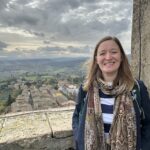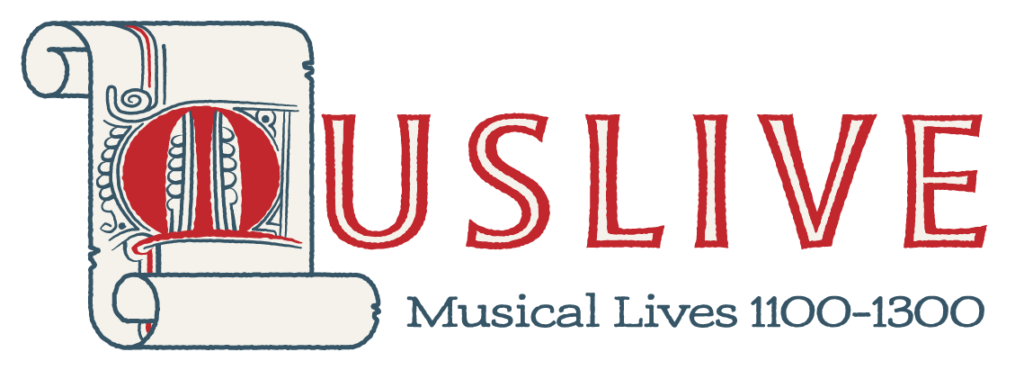In addition to our advisory board, Musical Lives enjoys the support of various friends (Old French: compaignons; Arabic: aṣdiqā‘, Latin: amici) who give their time, energy, and expertise to help us develop different strands of the project.
Performing trouvère song
Dr SEAN CURRAN
Sean Curran specialises in music and literature, their histories, material supports, and social practices, from the eleventh to the fifteenth centuries. His research interests include songs, texts, books, and liturgies from Britain and France, which he approaches from a multidisciplinary perspective, with a particular emphasis on how styles exist in and are transmitted through time and how different artistic media draw on one another. Dr Curran has contributed chapters to edited volumes on the Montpellier Codex and medieval music manuscripts, and his 2017 article on hockets won both the Jerome Roche Award of the Royal Musical Association and the Alfred Einstein Award of the American Musicological Society, the highest prizes in the field of musicology for an article by a junior scholar.

DR MARY FRANKLIN-BROWN

Mary Franklin-Brown is a medieval literature specialist who has published on a variety of topics including medieval encyclopaedias, learned Latin poetry and prose, Franco-Occitan epic, French romance, and medieval chess, but courtly song remains particularly close to her heart. She has published studies on troubadour chansonnier R, chess among the troubadours, and the architectural acoustics of the earliest troubadours (forthcoming). In 2024, she looks forward to collaborating with Dr Sean Curran to produce a new edition of the Sponsus, an eleventh-century paraliturgical play in Latin and Occitan.
Prof Jane Gilbert
Jane Gilbert’s research focuses on medieval French and English literature (both separately and comparatively) with an active interest in modern critical theory. From 2011-2015, she was a co-investigator on the AHRC-funded project Medieval Francophone Literature Outside France, whose project monograph (co-authored with William Burgwinkle and Simon Gaunt) was published by Oxford University Press in 2020. Professor Gilbert’s current project is on Form in Translation, in which the understanding both of ‘form’ and of ‘translation’ are ongoing questions. She is interested in thinking about how literary form translates in medieval texts and manuscripts, in how forms are laid out in manuscripts, and in the affective, literary and philosophical consequences of form across a corpus ranging from Old and Middle French (both continental and ‘insular’, that is, ‘Anglo-Norman’ and ‘Anglo-French’), Middle English and Latin, and includes texts and manuscripts from the eleventh to the fifteenth centuries.

DR DONALD GREIG

Donald Greig is a professional singer with a specialisation in early music, as well as a scholar with research interests in film studies and semiology. He was co-founder of The Orlando Consort, with whom he sang for its thirty-five year existence, and was a member of The Tallis Scholars for over twenty-five years. Dr Greig received his doctorate in music from the University of Nottingham. His novel, Time Will Tell, was published in 2012, and his first academic book, Baroque Music and Cinema, was published by Cambridge University Press in 2021. Dr Greig has contributed chapters on film and music to various books, and several articles have been published in academic journals. He is currently writing a book for Oxford University Press on the production, reception, and musical remediations of La Passion de Jeanne d’Arc (Carl Theodor Dreyer, 1928).
Dr Alice Hazard
Alice Hazard completed her PhD at King’s (under the supervision of the late Prof Simon Gaunt) on French literature of the twelfth and thirteenth centuries. Her first monograph, The Face and Faciality in Medieval French Literature, 1170-1390, was published by Boydell & Brewer in 2021. Dr Hazard’s current research focuses on modes of technology in medieval French narrative.

Prof Yolanda Plumley
Yolanda Plumley specialises in the music, literature and cultural history of the late Middle Ages. Her publications include books and articles on citation, allusion and intertextuality in fourteenth-century French songs and lyrics, notably The Art of Grafted Song: Citation and Allusion in the Age of Machaut (OUP, 2013) and she is general editor, jointly with R. Barton Palmer, of a new edition of the complete music and poetry of Guillaume de Machaut. She also collaborated with the Orlando Consort on a series of 12 CDs devoted to Machaut’s music. Her current projects include a study of new manuscript fragments with French Ars nova songs.
Arabic and Hebrew poetry
Dr Mohamed Ahmed

Mohamed Ahmed is currently Principal Investigator for the European Research Council-funded project Arabic Poetry in the Cairo Genizah, which aims to make the entirety of Arabic and Judaeo-Arabic poetry in the Cairo Genizah accessible to scholars and to the public. Dr Ahmed was previously granted a research fellowship funded by the DFG (German Research Foundation) to work on Arabic letters in the Prize Paper Collections, as well as a research stipend from the Thyssen Stiftung Foundation to work on a postdoctoral project on code-switching in Judeo-Arabic texts at the Freie Universität Berlin. He studied Semitic languages and Modern Hebrew language and literature at Mansoura University, Egypt and went on to complete a DAAD-funded PhD at Leipzig University. Dr Ahmed’s research interests lie in the areas of Arabic poetry, Judaeo-Arabic, bilingualism, the typology of written code-switching, code-switching in Modern Hebrew and medieval Judaeo-Arabic texts and sociolinguistic variation between Arabic and Hebrew.
Charters
Dr Hannah Boston
Hannah Boston is currently a Leverhulme Early Career Fellow at the University of Lincoln. Her work focuses on the ‘private’ charters of Lincolnshire and Shropshire between 1000-1307, and seeks to use these as a way into regional discourses of power and property. She is interested in use of writing, legalism, and landscape. She is also co-running a research network on Loyalty in the Medieval World with Dr Chris Lewis (School of Advanced Studies, London). Hannah completed her doctorate at Trinity College, Oxford, on structures of lordship in the English north Midlands between 1066-c.1216. Her first monograph, Lordship and Locality in the Long Twelfth Century, was published by Boydell and Brewer in 2023.

Dr Robert Gallagher

Robert Gallagher is a historian of early medieval Britain, its cultures, politics and literatures, and a Senior Lecturer in Early Medieval History at the University of Kent. He is particularly interested in thinking about the roles that texts, the written word and multilingualism played in early medieval settings, and how different disciplinary approaches can work together to enhance our understanding of textual artefacts and their social contexts. He has published studies on the authorship of Latin verse and charters; language choice in documentary production; and intertextuality and performance. Many of these themes also inform his first monograph, The Written Word in Early Medieval England: Kent, Mercia and Wessex, c.830–920, which will be published by Cambridge University Press in 2026. Robert will soon be embarking on a major new project to produce the first-ever comprehensive study of letter-writing in early medieval Britain, thanks to a Leverhulme Trust Research Project Grant (2026–29).

